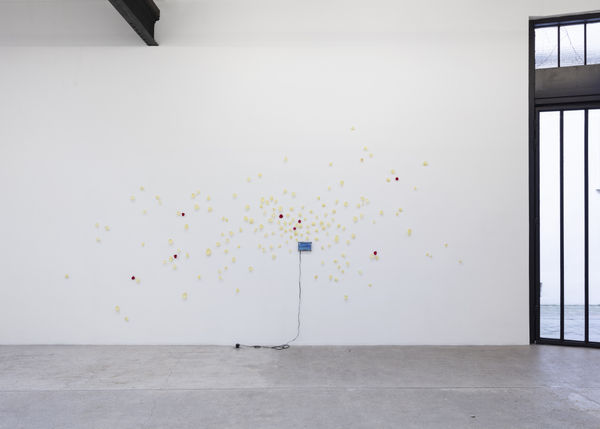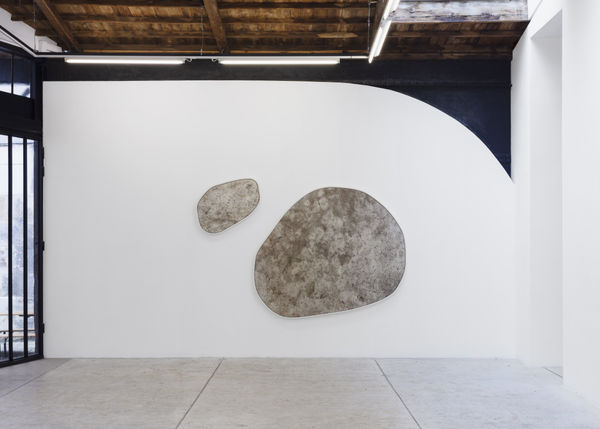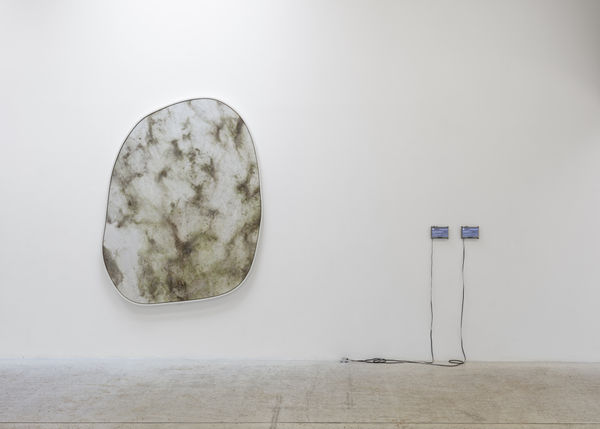Davide Balula: Some farmed, others mined
Past exhibition
Overview
Some farmed, others mined is the most recent body of work by Davide Balula
that engages with the artist’s long-standing inquiry into ecology, microbial social
theory, and machine-based learning systems. Balula’s concerns, formalized here,
highlight the entangled relations of life and non life in a moment of technocratic
governance. The works hone in on the need for ecological transition, care and
responsibility, while living on a damaged planet increasingly moderated by
machines.
From spring 2020 to spring 2021, while living in isolation in the countryside
with his family, Balula left unprimed canvases in contact with their immediate
environment. These “farmed paintings” take root in earlier experiments where
he would place unprimed canvases in riverbeds, inside trees, and underground,
inviting a world of relations between wildlife, weathering, and environmental
fluctuations. Cast in shades of green, pink, brown and black, microorganisms are
captured here through abstract patterning by chance-based relations. The works
speak to the greater universe, such as star systems, or viral cultures under scrutiny.
They are the actants of their own scene, directly present rather than represented.
Currently, planetary life is under imminent existential and environmental threat.
The announcement of the Russian-Ukraine war together with the latest IPCC
report* stands as an indictment of failing political leaders and their complicity
with a fossil fuel industry deeply embedded in the destruction of the earth. Balula’s
“A.I. Generated Instructions” allude to this stark reality while also engaging with
that engages with the artist’s long-standing inquiry into ecology, microbial social
theory, and machine-based learning systems. Balula’s concerns, formalized here,
highlight the entangled relations of life and non life in a moment of technocratic
governance. The works hone in on the need for ecological transition, care and
responsibility, while living on a damaged planet increasingly moderated by
machines.
From spring 2020 to spring 2021, while living in isolation in the countryside
with his family, Balula left unprimed canvases in contact with their immediate
environment. These “farmed paintings” take root in earlier experiments where
he would place unprimed canvases in riverbeds, inside trees, and underground,
inviting a world of relations between wildlife, weathering, and environmental
fluctuations. Cast in shades of green, pink, brown and black, microorganisms are
captured here through abstract patterning by chance-based relations. The works
speak to the greater universe, such as star systems, or viral cultures under scrutiny.
They are the actants of their own scene, directly present rather than represented.
Currently, planetary life is under imminent existential and environmental threat.
The announcement of the Russian-Ukraine war together with the latest IPCC
report* stands as an indictment of failing political leaders and their complicity
with a fossil fuel industry deeply embedded in the destruction of the earth. Balula’s
“A.I. Generated Instructions” allude to this stark reality while also engaging with
More information : anna@galeriefrankelbaz.com. Press: clara@galeriefrankelbaz.com
his past work. The texts on the screens in the gallery are not description labels
per se, but orders, instructions, and direct commands from a machine trained
on the artist’s past projects. Awkward, even humorous in their error, one might
question if giving AI such an agency of human-compatible values means that it is
merely techno-solutionism?
Balula’s visual output, produced in the outbreak of a global pandemic,
demonstrates how microbial intelligence is central to the metabolic circuitry of
life, beyond the human. Many neural networks appropriate the intelligence
of microorganisms in their training. In many ways, the Farmed Paintings and
A.I. Generated Instructions point to a need to transcend human-centered
exceptionalism, embracing multispecies ecologies. Notably the urge for communal
and embodied approaches to living and learning from human to microbe and
mycelium, recalling the restorative potential of collective cognition. Such metabolic
narratives acknowledge learning and knowledge-building as a form of care.
Jennifer Teets
his past work. The texts on the screens in the gallery are not description labels
per se, but orders, instructions, and direct commands from a machine trained
on the artist’s past projects. Awkward, even humorous in their error, one might
question if giving AI such an agency of human-compatible values means that it is
merely techno-solutionism?
Balula’s visual output, produced in the outbreak of a global pandemic,
demonstrates how microbial intelligence is central to the metabolic circuitry of
life, beyond the human. Many neural networks appropriate the intelligence
of microorganisms in their training. In many ways, the Farmed Paintings and
A.I. Generated Instructions point to a need to transcend human-centered
exceptionalism, embracing multispecies ecologies. Notably the urge for communal
and embodied approaches to living and learning from human to microbe and
mycelium, recalling the restorative potential of collective cognition. Such metabolic
narratives acknowledge learning and knowledge-building as a form of care.
Jennifer Teets
Installation Views







